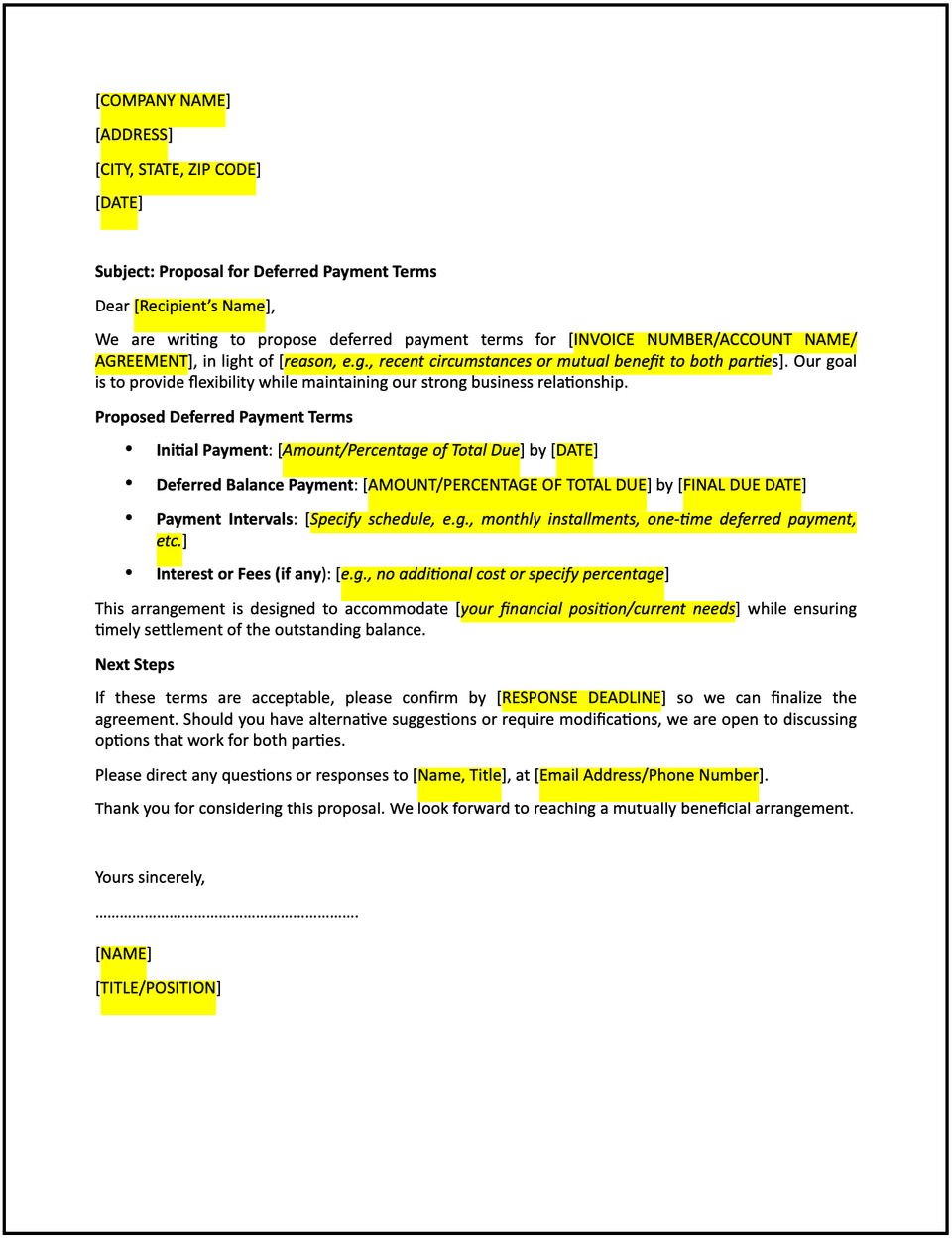Proposal letter for deferred payment terms: Free template

Proposal letter for deferred payment terms
A proposal letter for deferred payment terms is a formal request sent to a customer, vendor, or financial partner to suggest a temporary adjustment to payment schedules. This letter outlines the proposed terms, explains the rationale, and emphasizes the mutual benefits of the arrangement, fostering trust and collaboration.
How to use this proposal letter for deferred payment terms
- Open with an introduction: Begin by addressing the recipient respectfully and explaining the purpose of the letter—to propose deferred payment terms.
- Provide context: Briefly describe the circumstances necessitating the proposal, such as cash flow challenges, unforeseen events, or a temporary financial adjustment.
- Outline the proposal: Clearly specify the deferred payment terms, including the new timeline, payment intervals, and any conditions.
- Emphasize mutual benefits: Highlight how the proposed terms will benefit both parties, such as enabling continued collaboration or reducing financial strain.
- Offer reassurances: Assure the recipient of your commitment to fulfilling obligations and maintaining trust.
- Invite collaboration: Encourage the recipient to discuss or negotiate the terms to ensure mutual satisfaction.
- Maintain a professional tone: Ensure the letter is clear, respectful, and focused on problem-solving.
- Provide contact information: Include details for the recipient to reach out with questions or to discuss the proposal further.
Benefits of using a proposal letter for deferred payment terms
This letter provides a professional and structured way to communicate a proposal for adjusting payment schedules. Here’s how it helps:
- Promotes transparency: Clearly explaining the proposal builds trust and reduces misunderstandings.
- Reflects professionalism: A well-crafted letter demonstrates respect and a commitment to resolving financial concerns.
- Encourages collaboration: Inviting feedback fosters constructive dialogue and mutual agreement.
- Reduces conflict: Offering clear terms and a rationale minimizes potential disputes.
- Supports financial management: Temporary adjustments allow both parties to maintain stability during challenging times.
Tips for writing an effective proposal letter for deferred payment terms
- Be specific: Clearly describe the deferred payment terms, including the duration, intervals, and conditions.
- Use professional language: Maintain a respectful and solution-focused tone to encourage cooperation.
- Provide context: Explain the reasoning behind the proposal to build understanding and goodwill.
- Highlight benefits: Emphasize how the deferred terms will benefit both parties in the short and long term.
- Include actionable advice: Offer steps for discussing, approving, or modifying the proposal.
- Keep it concise: Focus on the key points while ensuring the tone is professional and collaborative.
Frequently asked questions (FAQs)
Q: What details should I include in this letter?
A: Include the proposed deferred payment terms, the rationale for the request, and steps for further discussion or approval.
Q: Should I personalize the letter?
A: Yes, addressing the recipient directly ensures clarity and demonstrates attentiveness.
Q: Who typically sends this letter?
A: Business owners, financial managers, or account representatives usually send this letter.
Q: How formal should this letter be?
A: The tone should be professional yet empathetic, focusing on collaboration and mutual benefit.
Q: When should this letter be sent?
A: Send the letter as soon as the need for deferred payment terms arises to allow sufficient time for discussion.
Q: Can this letter include alternative proposals?
A: Yes, offering multiple options demonstrates flexibility and increases the likelihood of agreement.
Q: Is acknowledgment from the recipient required?
A: While not mandatory, encouraging acknowledgment ensures the recipient is aware of and considering the proposal.
This article contains general legal information and does not contain legal advice. Cobrief is not a law firm or a substitute for an attorney or law firm. The law is complex and changes often. For legal advice, please ask a lawyer.


